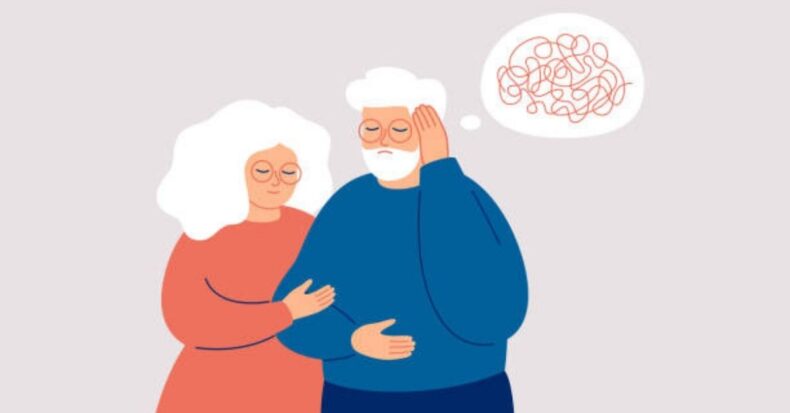While everyone is discussing the giant technological leap the world has taken, society has neglected one section of the community – The older adults. Humans are protecting themselves from the pandemic outbreak and walking straight into the endemic of mental health disorders.
Debating over the privileges within the haves and have nots, very little attention is paid to the mental health of senior citizens. They are having a hard time in the backdoor adapting to these drastic changes.
As we sit at home saving ourselves from the outburst of the pandemic, indulging more in technology than ever, social distance has torn us apart from the outer world. The mental health disorders do not spare anyone by age and find a way to creep in.
According to a WHO report – Mental health of older adults 2017:
- The older adults from 60 and above population will nearly double from 12% to 22% between 2015 and 2050.
- Mental health and well-being are as important in older age as at any other time of life.
- Among older adults, mental and neurological disorders account for 6.6% of this age group’s total disability (DALYs).
- Approximately 15% of adults aged 60 and over have a mental illness.
The older adults above the age of 60, although in the backdoor, make valuable contributions to society as family members, volunteers of various organizations. The mental health disorder does not spare people my age.
While young adults adapt to new methods in this fast-paced advanced technology, they are still emotionally distancing themselves from people in the immediate world.
Factors that affect the mental health
Fast-paced advancement – The older a face a hard time adapting to the changes. Old age is a stage of life, and not keeping up with technology shouldn’t be a boon for anyone. They can adjust to new age earning modes and survive, but the impact of the pandemic is more than that.
Restriction on movement – The older adults were restricted to actions, so no physical activities. Doctors mostly suggest they take walks for a healthier lifestyle and walking, and light exercise is the only movement they get to stay healthy. Staying at home also results in suffocation.
Isolation – Being confined to the four walls of the house, with family around them immersed in technology, they have to make an effort to break into their bubble.
The senior citizens living alone have a problem surviving, and the government has restricted the aged people from working.
Some live alone and face the difficulty to do menial tasks; there is no house help available. Going to the parks, meeting friends was the only social and essential part of their life left.
Coping with older adults is also at greater risk of developing neurological disorders and other physical health problems. It gets difficult to accept that their bodies cannot support them as they did in their younger days.
Comorbidities – Most of them, with existing comorbidities, are told to work out by the doctors. Even if they manage to do that, their health problems are irresistible.
Dependency – Their dependence on the family and their medical needs have increased.
Resistance to accepting old agethe resistance to accepting the ageing process develops more problems.
The survey, conducted by Agewell Foundation, an NGO, had volunteers interacting with 5,000 older adults on the phone to assess the impact of the Lockdown on their lives. Around 55 per cent asserted that the Lockdown was affecting their health condition.
Consequences of the pandemic on the mental health of older adults
There has been a rapid increase in the number of calls on mental health helpline numbers. Senior citizens mostly place these. It has been difficult for them to cope with the Lockdown, and the fear of pandemics is overpowering their health.
A 66-year-old resident of Andheri said, “The members of my family are drowned in technology and have very little time outside of it. We feel alone. We cannot even meet our friends.”
Loneliness can be felt at any point in life.
Another senior citizen said, “I am retired and stay alone here, because of the pandemic it has been difficult to get any help. The maids cannot come, so getting groceries, cooking and doing household chores is unbearable.”
They cannot go outside to get the job done as it poses a high risk to their life and neither can they stay at home. Older adults are the most trapped section of society, and we are a long way from the solution other than ending the Lockdown.
A counsellor of the Mumbai helpline number said, ” we are promoting awareness campaigns more than ever. These aged people were utterly unaware of their mental health and are now actively seeking health and getting better.
We cannot help them with their physical tasks, but we take a solid stand to support their mental health.” The primary reasons for people calling on these helpline numbers are that family members have never been together for a long time in the same place.
There is a lack of personal space or interaction, and loneliness has crept in. The news of many people losing life is depressing, and they feel that this is how the end comes.
Staying at home not only causes harm to their mental health but physical health as well.
The doctors suggest that senior citizens work out regularly, go out for walks, and join social groups like the laughing club.
Now, they have to adjust to the new norms and adapt the technology for survival. This drastic change also has a substantial psychological impact.













